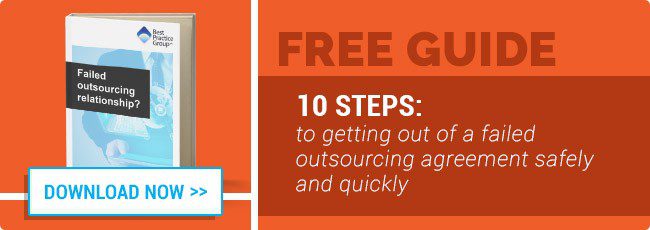
If matters have come to a head and no matter what you’ve tried, your IT vendor is simply unable to deliver its solutions to your expectations, then you may have to begin the process of project termination.
This decision should never be taken lightly. Project terminations can be costly, disruptive and can leave you mired in legal red tape. Only after you’ve attempted to re-align the project, build trust and make every effort possible to ‘make it right’, should you consider termination.
1. Are you sure you need to terminate?
Terminating and exiting a large IT project is a major undertaking with significant risks, both financially and operationally. It’s not something to undertake lightly or because emotions are running high. You need to be sure that you have done everything you reasonably can to help realign the project before you terminate. In fact, if matters come to court, you are likely to be penalised on costs if you haven’t made reasonable, sustained and coordinated efforts to get the project back on track. Renegotiating the structure and/or deliverables of the project is often a much more effective – and less risky – course of action.
2. Benefits vs Risk: Making the case for termination

Terminating the contract early must be treated as a significant project in its own right, which means it requires a business case before you go ahead. Your business case must assess the strengths, weaknesses, opportunities and threats of terminating. Only if this analysis stacks up and proves more beneficial than reconciliation, should you pursue it further.
3. Work out what will replace the project you’re terminating
When an IT project goes wrong, the stress and emotional strain can dominate your thoughts. However, unless you find a new way of getting the project delivered (whether in-house, via an alternative vendor or a combination of both) and undertake appropriate due diligence on it, then there is no guarantee that you’ll be better off. One of the best uses of your time ahead of termination is therefore to consider what you want to do once you’ve terminated. Whether that’s bringing the project in-house or transitioning to another vendor, you need to begin preparation and complete your due diligence before you terminate, to smooth the handover process and minimise the risk.
4. Plan your exit

Getting out of a project is often more work than getting in and has potentially more operational and financial risks. A well-considered exit plan allows you to identify what you will need to make a successful transition. Issues are often missed during the exit process, so a proper plan will ensure you cover these off and minimise the potential for disruption. Ensure you use a business case to measure the progress of your exit and ensure everything is proceeding as intended.
5. Prepare your evidence

To make the project termination process as smooth as possible, you will need evidence that your vendor has failed to achieve the key deliverables and that what it delivered was not fit for purpose. In preparing this evidence, it’s vital that you focus on the right elements. A key part of this is your vendor’s expert responsibilities see our ‘Strategic Vendor Responsibilities’ paper for a more comprehensive view. You might consider engaging an independent specialist to assess the evidence from an independent and ‘critical friend’ perspective, to ensure you are adopting the most effective approach.
6. Sanity check your evidence
Once you’ve gathered your evidence, the next step is to evaluate whether it shows what you thought it would and that it’s strong enough to proceed. Evidence is often imperfect. At the end of this stage you should know whether or not it shows, on balance, that the vendor has provided the key deliverables that would reasonably have been expected from it. You will also be clear whether you have interpreted vital elements of your evidence correctly, such as your vendor’s expert responsibilities and how they should be benchmarked against what is reasonable. The safest and most cost-effective way to check your evidence is to have someone independent undertake a critical friend challenge, so they can advise you of what works, what doesn’t and where your focus of evidence should be, according to the business outcomes you are trying to achieve.
7. Choosing the right forum for your termination
When you decide to terminate your agreement, there are a number of different forums for doing so – negotiations, mediation, expert determination, arbitration or litigation. Check your contract as it is likely to describe the escalation process. Each has advantages and disadvantages, depending on what you’re trying to achieve. Selecting the right forum can significantly reduce your costs and speed up the process. There is little point proceeding directly to litigation if a less formal and lower-cost process can achieve your goals.
8. Negotiating an early contract termination and exit with your vendor

Negotiating an early contract termination and exit is challenging and emotions often run high on both sides.
However, there are steps you can follow which will smooth the process and increase your chances of a successful outcome. In particular, if your vendor has not provided key deliverables on the project and has therefore breached its expert responsibilities, and you have had the evidence independently validated and prioritised, then the negotiation process will be much swifter. Setting out your arguments clearly, with solid and independently validated evidence, will help your vendor to understand that it will cost it more to resist the termination and exit than it will to comply, agree and support the process. Always be sure to align your termination and exit negotiation strategy with the written contract terms, and always seek independent and qualified advice in respect of formal termination. Damages for adopting the wrong termination and exit procedure can be penal.
9. Managing the exit process
As part of the process of formally terminating the relationship, you need to treat the exit process as a project and have resources allocated to it, external and internal support, key milestones, objectives, payment profiles and performance targets. You must also make sure that you manage the exit process in the right way, so your actions don’t inadvertently remove your vendor’s expert responsibilities. Governance and performance management are critical to a successful termination and exit process. Make sure you give it the time and attention it needs.
10. Hiring lawyers and technical experts

Many clients need independent support when terminating a contract, to avoid the potential financial damages that a vendor can claim if the contract is terminated incorrectly. It is therefore vital to choose the right lawyer and technical expert, instruct them properly and to manage their output, so you get the outcomes you want and achieve value for money. This is covered in detail in our article Hiring ‘legal’?: Getting Value for Money
Summary
-
If you cannot get implementation back on track, despite trying all reasonable steps, you may have no choice but to end the agreement. Ending an agreement early is a major project in its own right and you must handle it in the right way, to ensure you are better off afterwards. This means creating a business case and only terminating the contract early if that business case stacks up.
-
A critical step is to decide – before ending the contract – what arrangement you want to replace it with and what business outcomes the replacement will serve, so you can begin planning for that ahead of time.
-
Gathering and sanity checking your evidence for contract termination will enable you to prove your case and smooth subsequent negotiations with your vendor.
-
Choosing the right forum for the contract termination – which can range from negotiation to litigation – can significantly affect the timescale and cost of the exit, as can your choice of lawyer or technical expert to help you.


